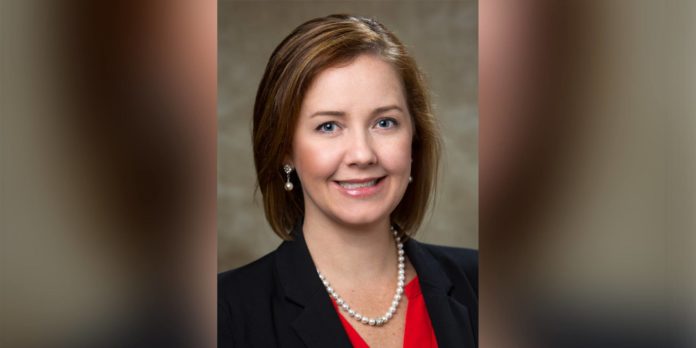ATLANTA – Andrea S. Meyer Stinson, Ph.D., associate director of the Master of Family Therapy Program and associate professor of psychiatry and behavioral sciences/pediatrics in Mercer University School of Medicine, is among a distinguished group of professionals collaborating to develop an initiative to address statewide needs in mental health, wellness and resiliency during the COVID-19 crisis.
Resilient Georgia’s Mental Fitness for Resilience Initiative is dedicated to meeting the needs of Georgians facing limited access to behavioral and physical healthcare, food, housing, education and financial stability. The initiative is working to sustain and build access to critical prevention and support services for at-risk individuals as Georgians face monumental challenges during this public health crisis.
The initiative recently launched the first in a series of filmed conversations among a diverse group of subject matter experts at Georgia Public Broadcasting (GPB) to discuss the varied needs of the community including teen concerns, mental wellness, stress, parenting, anxiety and depression.
In addition to Dr. Meyer Stinson, these experts included Brenda Fitzgerald, M.D., board chair of Resilient Georgia, former director of the Centers for Disease Control and Prevention and former Georgia Department of Public Health Commissioner; Sarah Y. Vinson, M.D., triple board certified child and adolescent, adult and forensic psychiatrist and associate professor of psychiatry and pediatrics at Morehouse School of Medicine; Caitlin McMunn Dooley, Ph.D., deputy superintendent of the Georgia Department of Education; and Kathy Colbenson, LMFT, president and CEO of CHRIS 180.
At the core of Resilient Georgia’s Mental Fitness for Resilience Initiative is a strategic focus on developing a scalable model that can be duplicated by localized subject matter experts across the state. Understanding the matrix associated with any given need varies tremendously by sector. The initiative leverages collaborative partners to systematically address each area with a collective impact approach to meeting the basic needs of those most vulnerable.
“We believe systems are adjusting to improve access to care as a result of COVID-19. As our collaborative network of professionals advocate and serve Georgians, it is important we continue to make strategic connections, share innovation and remove as many barriers as possible so we can continue to meet the needs of the most vulnerable,” said Brenda Fitzgerald, M.D., board chair of Resilient Georgia.
In total, the initiative has assembled approximately 20 subject matter experts addressing 13 mental health topics. Participants include a wide variety of notable, diverse organizations including the schools of medicine and nursing from Augusta University, Emory University, Morehouse University and Mercer, as well as Children’s Healthcare of Atlanta, CHRIS 180, Georgia School Based Health Alliance, Center for Victims of Torture and the Georgia Alliance of Therapeutic Services.
About Resilient Georgia
Resilient Georgia is dedicated to aligning public and private efforts and resources across the state that support resiliency for all persons aged 0-26 and their families. This includes the use of essential tools such as education/teaching/training, workforce development, policy strengthening, practical research and evaluation. Our mission at Resilient Georgia is to lead a statewide coalition to develop a closely aligned trauma-informed public and private network working toward a united vision to create a birth through 26-year-old integrated behavioral health system. Key components of the overall vision, to be implemented by a variety of partners, include advocacy, policy, prevention and intervention, research, and system-of-care implementation and coordination. To date, more than 50 organizations and 200 leaders are aligned with Resilient Georgia’s three-year strategic plan. To learn more about Resilient Georgia, visit www.ResilientGA.org.
About Mercer University School of Medicine (Macon, Savannah and Columbus)
Mercer University’s School of Medicine was established in 1982 to educate physicians and health professionals to meet the primary care and health care needs of rural and medically underserved areas of Georgia. Today, more than 60 percent of graduates currently practice in the state of Georgia, and of those, more than 80 percent are practicing in rural or medically underserved areas of Georgia. Mercer medical students benefit from a problem-based medical education program that provides early patient care experiences. Such an academic environment fosters the early development of clinical problem-solving and instills in each student an awareness of the place of the basic medical sciences in medical practice. The School opened a full four-year campus in Savannah in 2008 at Memorial University Medical Center. In 2012, the School began offering clinical education for third- and fourth-year medical students in Columbus. Following their second year, students participate in core clinical clerkships at the School’s primary teaching hospitals: Medical Center, Navicent Health in Macon; Memorial University Medical Center in Savannah; and Piedmont Columbus Regional Hospital and St. Francis Hospital in Columbus. The School also offers master’s degrees in family therapy, preclinical sciences and biomedical sciences and a Ph.D. in rural health sciences.










